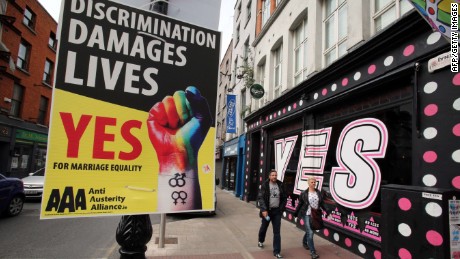Ireland could be first to legalize gay marriage by vote
Explainer: Ireland's world-first popular vote on gay marriage
Story highlights
- Ireland holds world's first popular vote to decide if gay and lesbian couples can marry
- Yes proponents say vote is about giving gay, lesbian couples same rights as heterosexuals
- No campaign says Yes vote will change definition of marriage and undermine family life
Tom Inglis is Professor of Sociology at University College Dublin. The opinions expressed in this commentary are solely those of the author.
CNN is showcasing the work of The Conversation, a collaboration between journalists and academics to provide news analysis and commentary. The content is produced solely by The Conversation.
Dublin, Ireland (CNN)Ireland is due to hold the world's first popular vote to decide whether gay and lesbian couples should be allowed to marry. The most recent opinion poll in The Irish Times indicated that 58% will vote in favor with 25% against, 17% were undecided or would not vote. Leaving aside the latter, this would suggest that 70% will vote Yes.
Women, single people and those living in urban areas were more likely to vote in favor, but the main division was along age lines. Only a third of those over 65 said they would vote Yes, compared to 70% of those under 34.
Opinion polls over the past few years indicate that the size of the Yes vote is declining, albeit slowly -- among those who said they had decided, it was as high as 80% last December. The big questions, then, are to what extent there is a shy No vote and to what extent the young people will turn up to vote.
What are the arguments?
The referendum is said to be about many things. The Yes proponents say that it is simply about giving gay and lesbian couples the same constitutional rights as heterosexual couples. Legislation passed in 2010 gave similar but not equal rights and responsibilities to gay and lesbian couples. A Yes vote will copper-fasten equal rights to all married couples regardless of sex.
The No campaign has emphasized that a Yes vote will change the definition of marriage and that it will have implications for adoption and surrogacy and that, in general, it will undermine family life.
Accepting gay love
In many respects the referendum is a litmus test as to what extent Ireland has become a modern, liberal, cosmopolitan society that approximates to the rest of the West, or to what extent it is a conservative, rural, Catholic society. The poll may be about rights, but it is also inevitably a test to decide if Irish people recognize and accept homosexuality and that two men, or two women, can love each other with the same intensity and passion as a heterosexual couple and whether the state should bless their love.
At a deeper level, the referendum is about whether Irish people can accept that gay and lesbian couples have sex which is as pleasurable and fulfilling as it is for heterosexual couples and that, when homosexual couples have children, those children are not harmed by having two parents of the same gender.
The role of the church
The referendum is also about the extent to which the Catholic church still acts as the moral conscience of Irish society. Once upon a time, the church held a monopoly over what Irish people considered to be right and wrong and how to live a good life. The vast majority of Catholics who formed the vast majority of the population in the Republic, followed the rules and regulations of the church.
However during the latter half of the 20th century this changed dramatically. It used to be that90% of Catholics went to Mass once a week. Now it is about 35%.
Despite this falling off in attendance, the 2011 census showed that 84% of the population freely declared themselves to be Roman Catholics. But being Catholic is not what it used to be. It would seem that approximately a third could be classified as traditional, orthodox Catholics, the majority of whom are older and live in rural areas.
Culture change
It would seem that the majority of Irish Catholics have become "cultural" Catholics. The majority of these cultural Catholics see being Catholic as part of their heritage. They are quite willing to send their children to Catholic schools: 90% of primary schools are owned by the Catholic church.
Cultural Catholics are quite willing to have their children baptized, to participate in their first Holy Communions and confirmations, to get married and be buried as Catholics. Being Catholic may not be a strong personal identity but it is still often central to family and community life.
The question this Friday is to what extent this cultural identity embraces liberal, cosmopolitan attitudes to being gay.


No comments:
Post a Comment